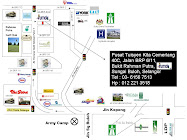In the early years of the Speak Mandarin Campaign, I often heard participants of Mandarin speech contests stressing on stage that as Chinese they took pride in being able to speak Mandarin (some even said they were very proud of it). Unfortunately, I hardly shared the feeling. I was saddened rather than elated.
What's gone wrong? Shouldn't Chinese speak Mandarin? And if this is so, what is there to be proud of?
If a Japanese were to say that he was proud that he could speak the Japanese language, wouldn't it be laughable? The irony, however, did not seem to occur to those contestants. Or perhaps they did not have better things that they could feel proud of?
As I see it, we can probably declare the Speak Mandarin Campaign a success only when Chinese Singaporeans stop making such remarks.
They can take pride in everything except the ability to speak Mandarin.
The worry now is that with the standard of English by and large higher than the mother tongue and the gap between the two widening, the emphasis on bilingual education will come under greater pressure.
Many people (including senior government officials) look at the issue with a simple logic: Since everyone understands English, statements, notices and booklets etc from government and statutory boards need to be printed only in English. Why take the trouble and waste resources to make them available in the other three official languages? They seem to think the request to use the Chinese language is to make life difficult for them.
Someone even raised in Parliament recently that students should not be compelled to learn the mother tongue, that it is enough for them to just learn the English language.
If such a view were to prevail, Singapore would eventually become a monolingual society and the bilingual policy would exist only in name.
To prevent such a scenario from becoming reality, there is a need to ensure that different ethnic groups maintain their mother tongues at an acceptable level and not allow them to decline further.
I believe it is not the aim of the government to turn Singapore into a purely English-speaking society. Yet if we allow the standards of the other three official languages, namely, Chinese, Malay and Tamil to plunge, we are effectively marginalising them and reducing their existence to only a symbolic one.
Take, for instance, the Chinese language. If the standard were to fall to the level of knowing nothing more than nursery rhymes for the young, they would probably still be able to sing along with local songbird Stephanie Sun, but reading Lianhe Zaobao would certainly be beyond them. Could we then claim our bilingual education policy a success?
It is worrying that the overall trend now seems to be for one to treat one's mother tongue as a foreign language. The reason for this is that an increasing number of Chinese families are using English as the only medium of communication at home.
According to the official Singapore Census of Population, the number of primary students using English as their main household language increased sharply from 9.3% in 1980 to 42.4% in 1999.
The 2000 figures showed that 35.8% of Chinese children aged between five and 14 use English as their main household language.
Commenting on this, language expert Dr Goh Yeng Seng said that should the language shift from Mandarin to English continue, English will emerge as the ethnic Chinese lingua franca in place of Mandarin in 10 to 20 years' time.
The aim of the Speak Mandarin Campaign is to make Mandarin the common spoken language among Chinese. Now it seems we are heading for the opposite direction and moving further and further away from the objective.
Think about it. Should what Dr Goh says happen, what price do we have to pay?
Our policy of having four official languages would become nominal, our multi-cultural society would become a mono-cultural one, and we would not be far from becoming a pseudo-Western society.
·The writer is an Executive Sub-editor of Lianhe Zaobao. Translated by Yap Gee Poh.
从前,华语运动开展时,常听到演讲比赛的一些参赛者在台上说:身为华人,我能讲华语,我感到很自豪(更有人说感到很骄傲)。
当时我心里感到的不是高兴,而是苦涩。怎么搞的,华人讲华语,合情又合理,竟然有将这种理所当然的事引以为荣。
如果有个日本人说:身为日本人,我能讲日语,我感到很骄傲,那简直是搞笑!可是,为什么新加坡却有些人这么说呢?难道也想搞笑?难道找不到别的事情可以自豪、骄傲?
所以,我认为,华语运动要是真的成功,我们就不再听到有华人说那样的话。新加坡可自豪的事还不少,拜托大家,别拿这样的事来引以为荣。
现在我们担心是,在英文水平普遍高于母语水平,两者的距离越拉越大的情况下,坚持双语教育将面对越来越大的压力。很多人(包括一些高级官员)有一个逻辑:既然大家都看得懂英文,为了减少资源的“浪费”,政府及法定机构所发的文告、通知书、小册子只须用英文好了,何必那么“麻烦”要用其他三种官方语文。
他们似乎以为,要求用华文就是跟他们过不去。最近甚至有人在国会说,不应该硬性规定学生必须学母语,只学英文就够了。如果让这种主张占主导,到头来,新加坡必成为单语社会,双语政策名存实亡。
要避免这个局面出现,我们一定要确保各民族本身的语文保持一定的水平,母语水平不能一降再降。
我们不相信政府的最终目标是要将新加坡变成一个“纯英文社会”,然而,华巫印三种官方语文的地位却是可高可低,降得太低,那就等于将这种语文边缘化,甚至成为点缀品。以华文来说,如果降到只有“手拍手,拍拍手”,“排排坐,吃果果”的水平,顶多是听得懂孙燕姿唱的华语歌,却看不懂《联合早报》,我们的双语教育能说是成功吗?
令人担忧的是,在今天的新加坡,将母语当外语似乎成了大趋势。形成这一趋势的原因是:越来越多华族家庭将英语作为家庭的唯一用语。根据官方人口普查数字,在家中讲英语的小一学生人数,1980年仅占9.3%,1999年升到42.4%。2000年的人口普查显示,年龄介于5至14岁的华族少年,35.8%在家讲英语。
针对这种情况,本地语言学家吴英成博士说,这种‘脱华入英’的趋势如果持续下去,快则10年,慢则20年,英语将成为新加坡华族最主要的母语。我们的华语运动原来有个目标:使华语成为华族的共同语,看来,我们现在是朝着相反的方向走,离开“华语是华族的共同语”这目标是越来越远。
大家有没有好好想一想,一旦新加坡到了那么一天,我们要付出的代价是什么?我们的四种官方语言政策将名存实亡,多元文化逐渐被单元文化取代,我们的文化传统有可能失传,那时,我们离一个“伪西方社会”还会远吗了?
skip to main |
skip to sidebar



pusattuisyenkitacemerlang@yahoo.com
We provide 1. Quality Teaching To Encourage Your Child's Learning Desire. 2. Quality Learning To Build Your Child's Self Confidence. 3.Quality Growing To Shape Your Child's Future. Email: pusattuisyenkitacemerlang@yahoo.com
Principal

Motivator and Academic Counselor

Location

pusattuisyenkitacemerlang@yahoo.com
Sharing Subjects
- Adat Melayu (6)
- B.Melayu - Karangan (1)
- KC 伟 杰 课 室 (25)
- KC 伟 杰 课 室 Proverb (17)
- KC 伟 杰 课 室 Reborn (15)
- KC 伟 杰 课 室- Travel (1)
- KC 伟 杰 课 室-出国留学 (14)
- KC 伟杰课室 - 教育 (10)
- KC 伟杰课室学习 (8)
- Kita Cemerlang (12)
- Kita Cemerlang - Sharing (106)
- Kita Cemerlang 雙溪毛糯- Work? (10)
- Komsas (6)
- Math Reference Tables (10)
- Maths Olympics (8)
- Photos (4)
- PMR - BM作文 (12)
- PMR - 华文 (17)
- PMR - 华文作文 (25)
- PMR - 英语 (1)
- PMR - 英语作文 (6)
- PMR-华语-孔子 (4)
- Science - Chemistry (9)
- SPM - B. M-Tatabahasa (2)
- SPM - BM作文 (20)
- SPM 华文 (4)
- SPM 华文作文 (3)
- STPM 华文 (4)
- STPM 华文作文 (1)
- Teacher (7)
- UPSR - 华语 (2)
- UPSR - 华语作文 (54)
- UPSR - 成语故事 (9)
- UPSR B.English (13)
- UPSR B.English - Grammar (28)
- UPSR B.English - Story (7)
- UPSR B.English Essay (16)
- UPSR B.M- Nilai Murni (5)
- UPSR B.Melayu (3)
- UPSR B.Melayu - Karangan (15)
- UPSR B.Melayu - Tatabahasa (20)
- UPSR Mathematic (11)
- UPSR- 华语 (39)
- UPSR- 华语古文 (21)
- UPSR- 科学 (17)